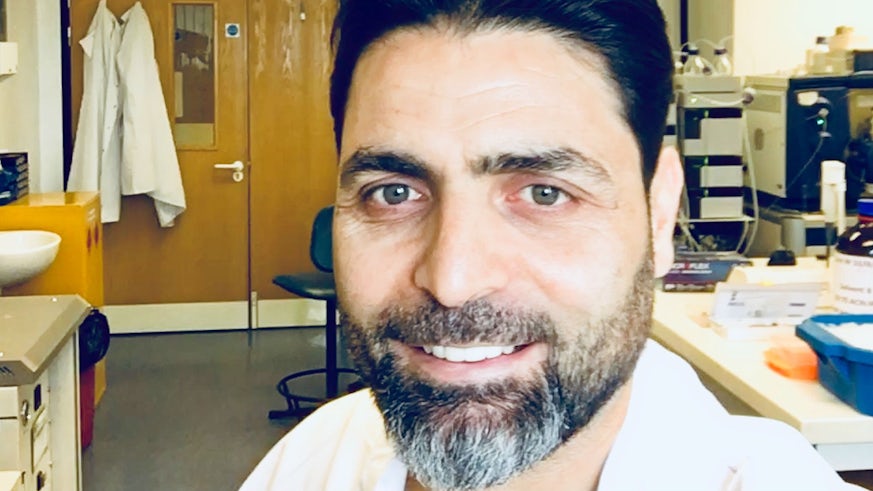Cardiff research boost for exiled Syrian
21 September 2018

A Syrian researcher exiled to Turkey has gained valuable experience working at the University’s School of Medicine as part of a scheme for ‘at-risk’ academics.
Ziad Alibrahim fled Syria in 2014 to escape the deteriorating situation caused by the Civil War.
Ziad, whose area of research interest is bleeding, has spent the summer based at Professor Val O’Donnell’s laboratory at the Systems Immunity Research Institute.
His eight-week visit included placements at the University Hospital of Wales coagulation laboratory, Welsh Blood Service, Birmingham University and Cardiff Metropolitan University.
The opportunity arose through the Council for At-Risk Academics’ (Cara) Syria programme, which supports exiled academics or those in immediate danger.
Ziad’s experiences in the UK have enabled him to generate new research ideas, develop new contacts and return to a lab for the first time in several years.
He is now planning to start a PhD in Turkey but eventually hopes to return to Syria to teach and help others.
He said: “My visit was fruitful and useful, because I attended lectures which helped me to update my information and allowed me to have a look at new research.
Cara is the direct descendant of the Academic Assistance Council founded by William Beveridge, director of the London School of Economics, in 1933 to help academics suffering under Nazi persecution.
Professor O’Donnell has a personal interest in Cara’s work having known Gustav Born, the son of German physicist and Nobel Laureate Max Born, who fled Germany under Hitler.
The family, including a young Gustav, moved to the UK and Gus eventually became a high-profile platelet biologist who maintained an active interest in haematology research until his death in his late 90s in 2018.
His story inspired Professor O’Donnell to get involved with the humanitarian work of Cara.
Professor O’Donnell, who knew Gustav through mutual research interests, said: “Gus told me many times he was hugely indebted to the people of the UK who welcomed his family with open arms; his story was an inspiration.
“It has been a privilege hosting Ziad in the group, and I am delighted that this visit will provide him with lasting contacts who he can continue to link with following his return to Turkey.”
Kate Robertson, of Cara, said: “The generosity of UK academics and the solidarity that they demonstrate towards colleagues whose worlds have been turned upside down never ceases to amaze me.
“Val is no exception and has gone out of her way to connect and support Ziad over his time with her team at Cardiff.”
There are many more Syrian academics looking for similar opportunities across a broad range of disciplines.
Share this story
Our systems biology-based research informs the development of novel diagnostics, therapies and vaccines against some of the greatest public health threats of our time.



